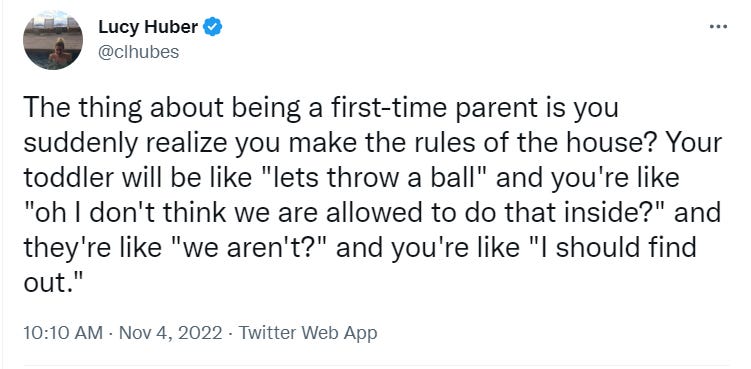Like many people, I’m a big fan of The Great British Bake Off, the long-running competition show in which amateur bakers compete in a weekly elimination format to be crowned Star Baker. The show has a gentle, low-stress charm, free of the manufactured drama and needless intensity of many American competition shows, and as long as you can overlook its occasional misguided forays into things like Pizza Week (catastrophic) or Mexican Week (catastrophic and problematic), it’s great television.
One of my favorite parts of each episode is the Technical Challenge, wherein each of the bakers is asked to produce a specific item, often a uniform batch of a particular baked good. The expectation is that each baker’s output in the challenge should look, taste and behave in a way that matches the professional judges’ expectations.
The catch, of course, is that the bakers are given incomplete instructions as to how to produce the item in question, ranging from mildly-vague directions like “knead the dough until it’s ready” all the way down to maddeningly-simple statements like “make two dozen Religieuses”.
In these moments, the competitors—all tremendously skilled and qualified bakers, some of the most talented in Britain—are often left at a loss, forced to plow ahead in the challenge with little confidence that what they’re doing is actually correct. They just have to start baking and hope everything turns out right.
I thought about these moments when this tweet came across my feed last week, from editor Lucy Huber:
In the moments immediately leading up to becoming a parent—especially if you’ve been fortunate enough to have good adult role models in your life—it can be easy to fool yourself into thinking that there’s a clear handbook for parenting, a straightforward list of Things You Should Do and Things You Should Not Do and instructions on exactly how long everything should be kneaded and proofed and baked.
Then, you carry a baby home from the hospital, and quickly find yourself in a spot much like those befuddled British bakers, staring at a piece of paper that’s blank, save for an instruction that says “raise a child”. Flip it over, there’s nothing on the back. That’s all there is, and the clock has already started, so you’d better get going, right?
Now, of course, there are some universal restrictions. You have to feed them and clothe them and treat them with reasonable care and not let them smoke cigarettes or ride in the front seat of the car or reproduce or retransmit baseball games without the express written consent of Major League Baseball. There are laws.
But the rules? Well, you make the rules.
Now, you might fancy yourself a chill, laid-back, easygoing person, an open-minded spirit who believes in free-range parenting. If that’s the case, hey, good for you! Not my place to judge. But, you’re still going to need to learn to be quick on your feet when a question of rules arise, because make no mistake, those questions will arise. As Trotsky is said to have once said, “you may not be interested in war, but war is interested in you.”
Daddy, can we eat dinner on the couch?
No. We’re having spaghetti and I like this couch.
Daddy, can I have Halloween candy for breakfast?
Yes, but only on November 1st and 2nd.
Daddy, can I ride the dog around like a horse?
I don’t know, ask him.
Daddy, can I go up on the roof?
Officially, no. But if you do, can you get some of those branches off while you’re up there?
There can be tremendous joy in making up the rules. If you grew up with strict restrictions on how you could play or what you had to eat or what you had to wear, it can be cathartic to tell kids of your own “no, you don’t have to do that”.
More often, though, there ends up a simmering, low-level angst about whether you’re setting the right rules, whether you’re setting too many rules or not setting enough rules.
If I let the kids eat dinner on the floor while watching television, will they grow up to be monsters or serial killers or people who leave shopping carts in the middle of the lot, even though there’s a cart return fifteen feet away?
The tricky thing about parenting is that you don’t find out if you’ve done a good job until well after the main part of your job is done, and by then, it’s too late to change course.
Until then, it’s all guesswork.
There are a thousand different roads leading from Point A to Point B, and plenty of room to swerve around on each one without ending up in the ditches. There’s no way to know which path is the right one for you and your children, because there simply isn’t one right path. What matters is less what the rules are, and more the spirit in which those rules are formed.
Any household rule—or lack thereof—can be valid, so long as it comes from a place of care, trust and respect, not just for the child but for yourself as well. You don’t cease to be a person in need of grace the moment you become The Rulemaker, so if you have to set up a few harmless guardrails in service of nothing other than your own sanity—or occasionally suspend the rules you’ve sworn were set in stone—well, it’s up to you, now, isn’t it?
So, to answer your question, yes. We can have cereal for dinner.
—Scott Hines (@actioncookbook)
New to reading The Action Cookbook Newsletter?
I write about parenting periodically, and if you appreciated today’s piece, you might also like some of my prior efforts on the subject. A few highlights:
The Best Parenting Advice I Ever Received
Reflecting on a time when a few simple words from a perfect stranger made all the difference.
Giants In The Nighttime
Learning to help my son cope with his fears—and me with my own—by chasing away the monsters on the edge of an autumn night.
A Hole In My Head
Thinking back on the day I learned I was going to be a father, and how much would change since then.
A World Like This
On parenting in a world full of terrible and frightening news, and looking for an answer to people who say “I don’t know how you can raise kids in a world like this.”
Those are all outside of the paywall, but there’s much more inside!
Upgrade to a paid subscription for only $5/month or $50/year and you’ll get access to all three weekly newsletters, including the jam-packed Friday morning weekend lifestyle guides, and access to The Internet’s Best Comment Section, chats on the Substack app, eligibility for periodic giveaways, and on top of all that, you’ll be supporting independent writing! You can’t lose.






I'll never forget the feeling of when we took our (now 9-year-old) son home from the hospital just a few days after he was born. "You mean they're just LETTING US TAKE HIM HOME???!!!!!" I was just astounded. After all the care and precautions you take in the hospital, during the birth and immediately after, the nurses just put him in the car with us and said, "good luck!!" Still blows me away!!! Loved this post.
I don't have children, but I had similar situations when I was teaching - what was the rule in my classroom wasn't always the rule in other classrooms. I stole a ton of ideas from people in this community about classroom rules/policies - and, for high schoolers, "treat them like adults until they give you reason not to, have the rules be clear, and explain the reasoning behind the rules" really smoothed most of the concerns.
As did occasionally breaking the rules, but requiring they clean up all evidence if they wanted it to ever happen again, which I thought of as, "don't tell your mother! But...." situations.
Anyway, all of this leads to my parenting advice, from somebody who spent many years dealing with the outcomes of other people's parenting - "if you're thinking about how and why for this, you're already better than three-quarters of parents, at minimum, so don't worry!"